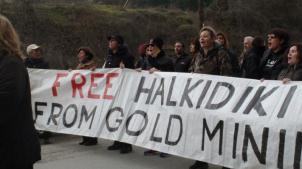
By Nick Meynen and Stavroula Poulimeni.
(For part 1 of this longread: click here)
The Greek mining company Hellas Gold pays both the police of the Halkidiki region and private security guards to secure a large gold mine in northern Greece. That does not scare off local residents to oppose a project that they believe will ruin their environment and future.
On 20 March 2012 thirty residents occupied a roadblock on an access road to a forest endangered by the mine. In response, Hellas Gold told all of its employees to “remove the demonstrators” or face job loss. The result: a fistfight in which fifteen protesters got seriously injured. Eight of them had to go to the hospital.
Police violence
In October 2012, a demonstration goes through the forests of Skouries, where the large open mine would come. Videos on YouTube show how the riot police attack women in the front rows and then chases them, for seven kilometers. The agents of the Halkidiki region are not afraid to beat up a sixty year old women. The police follows-up by suing sixteen protesters for “resisting the authorities and attempts to inflict bodily harm to the police.” Amnesty International follows up with case for human rights violations by the Greek State forces against unarmed, nonviolent citizens.
In March 2013, more than 200 heavily armed officers raid the village of Ierissos. A few nights earlier, some people had set a few vehicles from Hellas Gold on fire. The policemen use a lot of tear gas bombs, also in the local school, where a student gets seriously injured. Dozens of other villagers needed first aid. A baby poisoned by the smoke was admitted to the hospital. In response, more than 20000 demonstrators walk to the Canadian consulate in Thessaloniki.
Giorgos Kyrianos says oxi
Giorgos Kyrianos, a 45-year-old forester, worked in most of the Greek mountain forests. When Hellas Gold asked him to cut a portion of the ancient Skouries forest, he refused. “If I thought the work was good for my country, I would do it. But in this case I know it’s a disaster.”
Some 180 hectares of primary forest have been cut down. Besides the mine itself, Hellas Gold also needs room for roads, a processing plant and a lake filled with toxic waste.
The Kakavos forest, the main water source for the entire region, is also threatened. Kakavos translates to “the mountain that never burns” because it has so much water in the soil that it never dries out. Experts warn that deforestation would make the region uninhabitable. Even if the lack of potable water doesn’t drive out the population, the dust will likely make the villagers flee.
Dust and cyanide
Hellas Gold claims that the open pit will produce 4324 tons of dust per year, with a high concentration of heavy metals. The company claims that it will not use cyanide, but considering they do so in the nearby Olympiada and Stratoni mines, the local population doesn’t believe them.
Environmental inspectors are active on the site since more than three years. At the end of 2015 they reported mismanagement of the mining waste. In January 2016, the Ministry of Environment issued a fine of 1.7 million euro to Hellas Gold for twenty-one environmental violations, such as a discharge of waste water full of heavy metals, far above the norm. Incidents like these were not reported. This doesn’t really help to regain the confidence of the population.
But what’s 1.7 million euro for Hellas Gold? Once the mine is completed, Hellas Gold expects to extract 4000kg of gold in the first seven years and 2550kg in the next twenty years. At the current gold price this brings the total revenue from that mine only to almost 3 billion euros. Another mine, Olympiada, should create a similar revenue stream from 2020 onwards.
Syriza is afraid of Eldorado
“The Greek state has nothing to gain but environmental cost from the investment”. Alexis Tsipras’ position on the proposed mine around Halkidiki was clear in 2013. Syriza always rallied against the gold mining projects. It’s with this position that Tsipras’s party won the elections in Halkidiki.
Giorgos Velegrakis specialized in the Halkidiki conflict for his doctorate. Until June 2015, he also worked for Syriza on hammering out an alternative development strategy than mining. His proposal to the government contained four main points: the cancellation of the project in Halkidiki, environmental restoration of the area, the phasing out of the “old” gold mining projects in the region and the reconstruction of the local economy.
According to Velegrakis, reconstruction must be based on agriculture, eco-tourism, forestry and fisheries. Velegrakis: “Unfortunately, the government has never implemented our proposal. Officially, there is no change in the position of Syriza, but there’s no point in denying that at this time, the party is very concerned that Eldorado will withdraw all investments from Greece and that money for environmental restoration will never come.”
Eldorado Gold creates and destroys jobs
Supporters of the project will always point to the two thousand jobs created by the mine. Rarely will they recognize that at the same time, the mine also destroys jobs. Tens of thousands of people in the area work as olive oil producers, beekeepers, foresters, fishermen, sheep and goat herders and of course everything that has to do with tourism. The tree-lined beaches are downright heavenly. Halkidiki alone has 1059 beekeepers, accounting for ten percent of the annual production of honey in Greece. But their bee habitat is starting to look like the Sahara.
A hundred kilometers north-west of Skouries is the city of Kilkis. In this mountainous region, the Galikos River provides the area of drinking water and fertile farmland. In 2011, the Greek Ministry of Environment tells the local government or that it wants to develop copper and gold mines in the Kroussia mountain range and around Mount Paiko, where respectively 4,000 and 11,000 people live. Initially, many locals are excited about the prospects of a major project that promises employment. Until the information on the consequences of the gold mining in Halkidiki find their way to Kilkis.
Open consultation
An “open public consultation in 2011 was organized solely online In October 2011, the Ministry organized an “open public consultation”. This took take place online only and the cities and the villagers discovered its existence only after it ended. The eleven comments mainly come from stakeholders in the mining project. With this “permission” in the pocket, the ministry opened an international auction of the rights to do mining around Kilkis.
In November 2011 the inhabitants create the front against Kroussia-Paiko mines, supported by five professors of the Aristotle University of Thessaloniki. The city council of Kilkis unanimously speaks out against the mines and soon gets the support of sixty NGOs, academic institutions, trade unions and seventy local authorities from the region. Opponents point to studies that show that there’s uranium in the ground and that exposing it will have disastrous health consequences.
Legal farce
The central government in Athens ignores the protests and declares that AKTOR SA, a subcontractor of the Canadian mining company Eldorado Gold Corporation, will receive the license. Owner of AKTOR SA. is George Bobolas, who also has a publishing house and television station, in addition to a construction empire. His son, Leonidas Bobolas, was arrested in 2015 for tax evasion, but was released after he arranged the overdue payment of 1.8 million.
Nine local authorities, including the municipality of Kilkis, appeal against the decision. The Orthodox Church expresses support for the resistance. Opponents hit the streets in large numbers. The national TV ERT3 is filming the demonstration, but for unknown reasons they don’t air it.
A courtroom drama follows. In April 2013, the Administrative Court of Appeal in Athens postpones a decision because the Greek Government had not submitted its file. Later, the same court postponed it again because the judge happens to be married to a manager of AKTOR SA. At the third session, the court decides that it actually has no jurisdiction and sends the case to the first level of Administrative Court in Athens, where the file still is. For almost five years now, some 15,000 residents who live in the concession have a sword of Damocles above them.
(Grand) mothers go into resistance
One of the anti-mine activists in Kilkis is Elena. “I’m not a tree hugger. When I first heared about the gold mine I thought it was great news. I was annoyed by people who had reservations about the plan. I said: “For heaven’s sake, why can’t you let anything positive happen in this town?”
Elena went to a debate organised by the City of Kilkis, where the City council explained how the ministry ignores and overrules them. “These were people of the same parties that were in power in Athens! I understood that if mining companies say they are low-cost gold producers, like Eldorado does, they don’t mean low cost to the environment and the people who live nearby. They mean that they use methods that are much more toxic, to offer shareholders more profit.”
Since then, Elena faces the prejudices towards activists from the many people who do not know what a gold mine entails. Her family is particularly worried. Her own mother once said,”if you want to go to that rally and get wounded or arrested, take your son with you. I’m not taking your role as a mother over when you’re gone.” But by now, Elena managed to take her mother to a demonstration. “Afterwards she said she was scared, but also proud of me!”
In Northern Greece, plenty of mothers and grandmothers suddenly find themselves on a hot commodity frontline.
The cheesemaker who didn’t want to give up
Giannis Stathoris learned to make cheese in 1986 and grew into a famous cheese maker with a turnover of four million euro and twenty-five employees. In his twenties, he already took part in the battle against TVX Olympiada, the previous Canadian mining company that operated in Greece. “I think gold mines are a catastrophe for our region and for the welfare of our children. You should not think in narrow financial terms, because the mine has a heavy impact on the earth that feeds us.”
During an environmental inspection on 17 and 18 December 2015, it became clear that at the line there’s asbestos in the soil. Hellas Gold knew this, but concealed it. The workers were not protected. The fact that asbestos is a carcinogen, is already known for decades.
In 2013, Giannis Stathoris was one of the four residents of Ierissos who was arrested. After four months in prison he was released on 6 November 2013. “The psychological pressure in prison was really tough for me. Fortunately, the support and love of my fellow villagers kept me strong.”
Stathoris is concerned that when the mine is in operation, Greeks will no longer buy products from the polluted region. “Of course it would also be a disaster for my business. Most farmers will give up, and the milk from the farmers who remain will be polluted by chemicals and dust clouds that come from the open mine. Apart from the natural beauty of our region, this is also the birthplace of Aristotle. There is so much we can do here, if the mine doesn’t come to destroy it.”
Even after his release from prison, Stathoris is going to demonstrations. The injustice and resulting will to resist seem to be deeper than the controversial gold.

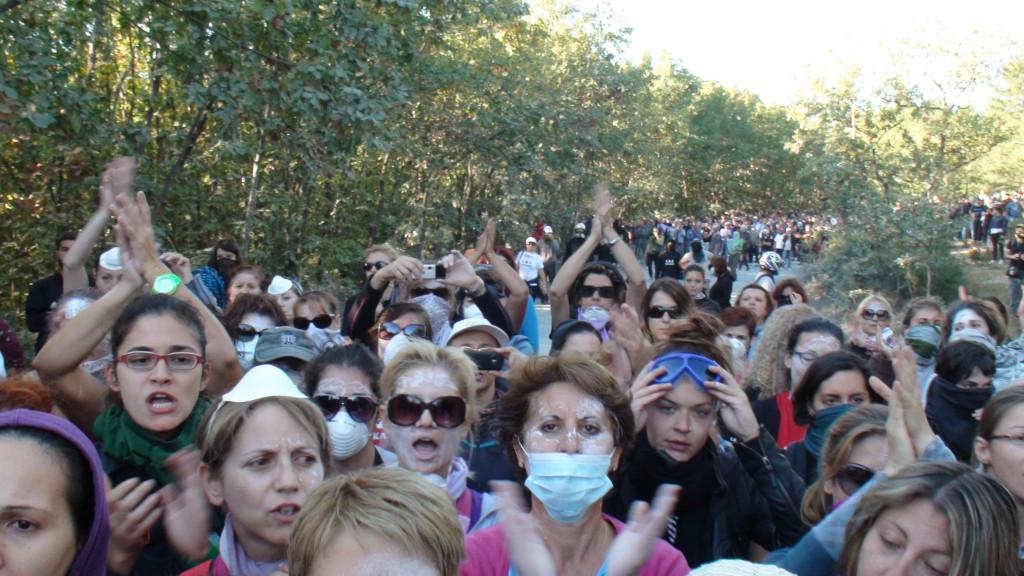
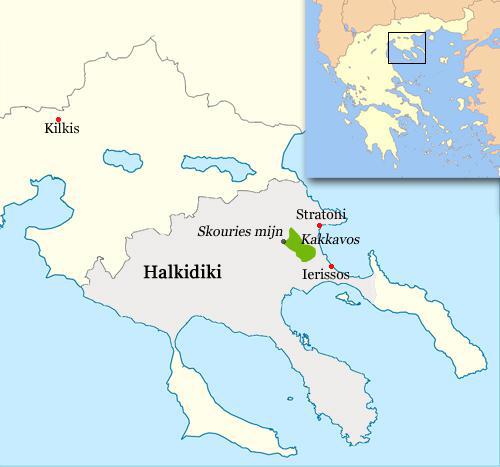
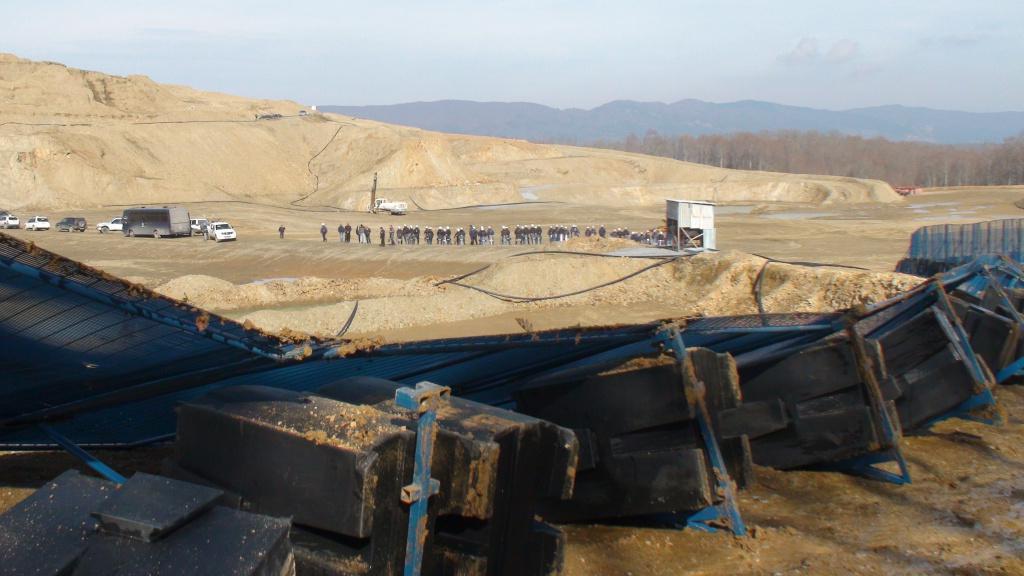
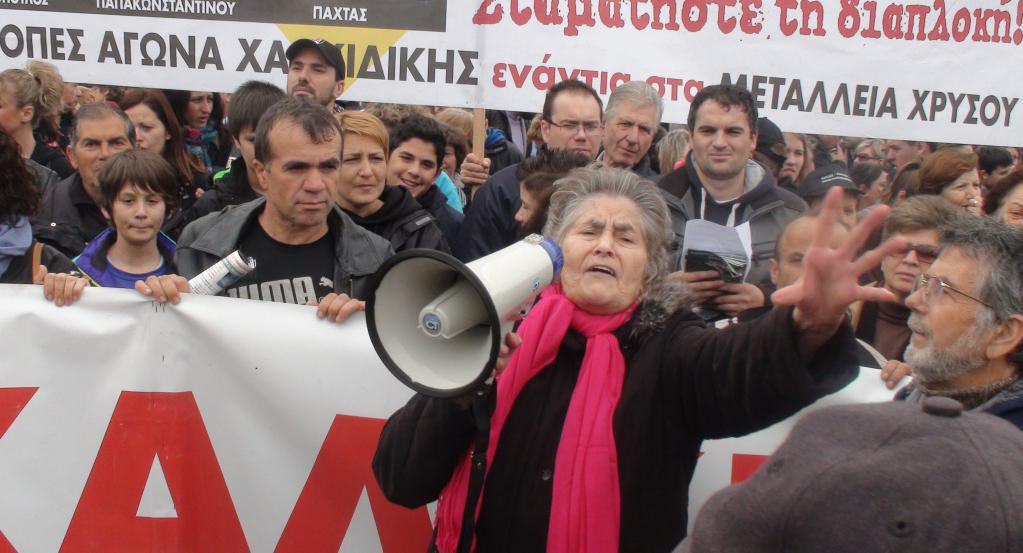
The project ENVJUSTICE has received funding from the European Research Council (ERC) under the European Union’s Horizon 2020 research and innovation programme (grant agreement No. 695446)